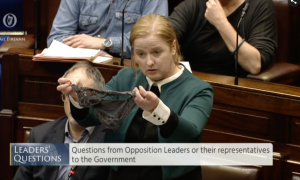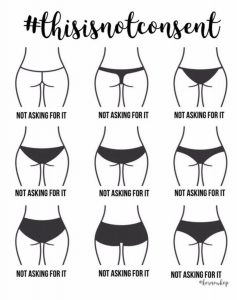Fair warning – distressing content. No judgement if you’re not in the mood.
Ah here. Have we made no progress at all in the last few decades?
We’ve seen a lot in the news here lately about the way that rape trials are conducted. I know the most recent one to make the front page has been reported in New Zealand as well. It was held in Cork where a 27-year-old married man was accused of raping a 17-year-old girl in an alleyway as she walked home. It was, sadly, nothing out of the ordinary at all (apart from the fact that she reported the rape and pressed charges) until the barrister for the defense argued that because the girl was wearing a lacy thong, she was open to the idea of sex and therefore shouldn’t be complaining when she got it.
Here is the direct quote from the trial transcript: ‘Does the evidence out-rule the possibility that she was attracted to the defendant and was open to meeting someone and to being with someone? You have to look at the way she was dressed. She was wearing a thong with a lace front.’
Actually no, you do not have to look at the way she was dressed, but what can you expect from a man who probably got his law degree in the dark ages, right? Maybe, but what’s the excuse then for Senior Counsel Elizabeth O’Connell?
How far have we not come that a woman – a woman! – can stand in court and imply that a 17-year-old girl should have known that a lacy thong, hidden underneath her clothing, is an open invitation to whoever might be passing by?
People are not happy about this. Not because it’s startling, but because it’s routine. It’s just another day in rape-culture-land. People are marching in the streets and leaving lacy underwear on the steps of the courthouse.
This is Stacie Ellen Murphy, protesting outside the Dublin court. She has vowed to walk the streets of Dublin every day in her underwear until she gets 50 others to join her. I hope they’re quick because the weather has taken a turn and she is about to get very, very cold. She’s not wrong though.
This is Opposition TD (MP) Ruth Coppinger, righteously embarrassing the Dáil (Parliament) by holding up a thong as she requests ‘massive legal changes’ in how rape trials are conducted. Specifically, she’s after the Taoiseach (PM) to take action to stop ‘rape myths’ from being used in court cases. Go her.
And on social media, women sharing photos of their underwear has suddenly become a thing.
The alleged rapist was found not guilty. I have no idea whether or to what extent the ‘her clothing shows she was asking for it’ train of thought contributed to his acquittal. I would hope not at all, but we have no information about what the jury based their decision on. Presumably there are all sorts of reasons why a 17-year-old virgin would choose her first sexual experience to be on the ground in the mud with a stranger, and then lie about it. Women do the darndest things.
This beautiful girl is Lindsay Armstrong.
In 2002, as the 17-year-old complainant at a rape trial in Scotland, she was forced three times to hold up, in front of the court, the underwear that she’d been wearing at the time, as the defense accused her of lying. Her attacker was found guilty but, feeling as though she’d been raped again by the humiliation and degradation of the court process, she took her own life two weeks later. Lindsay’s mother has come forward in the light of this recent case to express her shock and disgust that this treatment of victims is still allowed to happen. She had assumed that it was a thing of the past and is quoted as saying that if the jury took into consideration what the victim was wearing they should ‘hang their heads in shame.’ She’s right, and they’re not the only ones who should be doing so.
Here’s what occurs to me. There are very strict rules around what is allowed to be divulged in court cases with the aim of making sure that defendants have a fair trial. Do you remember the Louise Nicholas case in New Zealand? She made historic rape allegations against three high-ranking police officers who were all ultimately acquitted. Once the trial was over, we found out that two of them were, at the time of the trial, in jail for another historic rape. In fact two of them have accrued quite a collection of accusers over the years. But during the trial, none of this was allowed to be mentioned in court in case it caused the jury to unfairly prejudge the defendants.
Our justice system is based on the presumption of innocence until proven guilty, and on the assumption that everyone is entitled to a fair trial. I have no problem with this. But what’s good for the goose is, as they say, good for the gander.
Why is it that facts which are deemed irrelevant to the matter at hand, such as previous convictions for similar crimes, can not be mentioned during a trial when they relate to the defendant, whereas anything about the victim – anything at all – is fair game? As we all know, what a rape victim was wearing is completely irrelevant. So is whether or how much she’d been drinking. So is any past history she may have had with the rapist, including the fact that she might be in a relationship with or even married to him. So are all the other circumstances around the event, apart from the single question of whether she actively consented to sex. She could be walking alone in the dark through the worst part of town, blind drunk and naked as the day she was born, and if she gets raped the only single cause of that is the rapist. None of the other things have any bearing whatsoever on how the responsibility should be allocated. So why is any of it allowed to be brought up at all?
Why do we have legal requirements to protect the presumption of innocence for the defendant, but not for the victim?
Preventing the jury from hearing certain facts can be done. It’s a well-established practice. It seems to me that the massive legal changes the TD above is asking for should include the extension of those protective provisions to complainants. Asking the judge or jury not to take into account facts like what the victim wore or how drunk she was once they’ve heard them is a ridiculous half-measure; the way to change the culture around victim-blaming is to put those details squarely off-limits. The way to get it into people’s heads that they are irrelevant is to make their very mention contempt of court and cause for a mistrial.
Here is the ideal: that you could sit through an entire rape trial and come away at the end with no knowledge whatsoever of what the victim had been wearing, where she was at the time of the attack, whether she was alone, whether she had been drinking or whether she had consented to sex with the defendant on any previous occasions.
There is some hope. Just yesterday a man in Northern Ireland was convicted of revealing the identity of a complainant in a different rape case on social media. It’s the first conviction of the type. He pled guilty and was fined £300, which is not a lot compared to the effect the exposure probably had on the victim, but it was a very high-profile case and so it does send a message. It’s a start.
I’m not going to be wandering the streets of Dublin in my undies with ‘Not consent’ written all over me in Sharpie any time soon, but I support those who do. I have daughters and they’re worth more.











